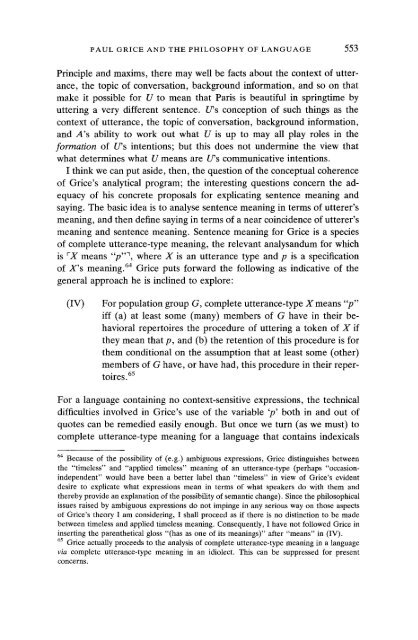Paul Grice and the philosophy of language
Paul Grice and the philosophy of language
Paul Grice and the philosophy of language
You also want an ePaper? Increase the reach of your titles
YUMPU automatically turns print PDFs into web optimized ePapers that Google loves.
PAUL GRICE AND THE PHILOSOPHY OF LANGUAGE 553<br />
Principle <strong>and</strong> maxims, <strong>the</strong>re may well be facts about <strong>the</strong> context <strong>of</strong> utterance,<br />
<strong>the</strong> topic <strong>of</strong> conversation, background information, <strong>and</strong> so on that<br />
make it possible for U to mean that Paris is beautiful in springtime by<br />
uttering a very different sentence. U's conception <strong>of</strong> such things as <strong>the</strong><br />
context <strong>of</strong> utterance, <strong>the</strong> topic <strong>of</strong> conversation, background information,<br />
<strong>and</strong> A's ability to work out what U is up to may all play roles in <strong>the</strong><br />
formation <strong>of</strong> U's intentions; but this does not undermine <strong>the</strong> view that<br />
what determines what U means are U's communicative intentions.<br />
I think we can put aside, <strong>the</strong>n, <strong>the</strong> question <strong>of</strong> <strong>the</strong> conceptual coherence<br />
<strong>of</strong> <strong>Grice</strong>'s analytical program; <strong>the</strong> interesting questions concern <strong>the</strong> adequacy<br />
<strong>of</strong> his concrete proposals for explicating sentence meaning <strong>and</strong><br />
saying. The basic idea is to analyse sentence meaning in terms <strong>of</strong> utterer's<br />
meaning, <strong>and</strong> <strong>the</strong>n define saying in terms <strong>of</strong> a near coincidence <strong>of</strong> utterer's<br />
meaning <strong>and</strong> sentence meaning. Sentence meaning for <strong>Grice</strong> is a species<br />
<strong>of</strong> complete utterance-type meaning, <strong>the</strong> relevant analys<strong>and</strong>um for which<br />
is rX means "p"~, where X is an utterance type <strong>and</strong> p is a specification<br />
<strong>of</strong> X's meaning. 64 <strong>Grice</strong> puts forward <strong>the</strong> following as indicative <strong>of</strong> <strong>the</strong><br />
general approach he is inclined to explore:<br />
(IV)<br />
For population group G, complete utterance-type X means "p"<br />
iff (a) at least some (many) members <strong>of</strong> G have in <strong>the</strong>ir behavioral<br />
repertoires <strong>the</strong> procedure <strong>of</strong> uttering a token <strong>of</strong> X if<br />
<strong>the</strong>y mean that p, <strong>and</strong> (b) <strong>the</strong> retention <strong>of</strong> this procedure is for<br />
<strong>the</strong>m conditional on <strong>the</strong> assumption that at least some (o<strong>the</strong>r)<br />
members <strong>of</strong> G have, or have had, this procedure in <strong>the</strong>ir repertoires.<br />
65<br />
For a <strong>language</strong> containing no context-sensitive expressions, <strong>the</strong> technical<br />
difficulties involved in <strong>Grice</strong>'s use <strong>of</strong> <strong>the</strong> variable 'p' both in <strong>and</strong> out <strong>of</strong><br />
quotes can be remedied easily enough. But once we turn (as we must) to<br />
complete utterance-type meaning for a <strong>language</strong> that contains indexicals<br />
64 Because <strong>of</strong> <strong>the</strong> possibility <strong>of</strong> (e.g.) ambiguous expressions, <strong>Grice</strong> distinguishes between<br />
<strong>the</strong> "timeless" <strong>and</strong> "applied timeless" meaning <strong>of</strong> an utterance-type (perhaps "occasionindependent"<br />
would have been a better label than "timeless" in view <strong>of</strong> <strong>Grice</strong>'s evident<br />
desire to explicate what expressions mean in terms <strong>of</strong> what speakers do with <strong>the</strong>m <strong>and</strong><br />
<strong>the</strong>reby provide an explanation <strong>of</strong> <strong>the</strong> possibility <strong>of</strong> semantic change). Since <strong>the</strong> philosophical<br />
issues raised by ambiguous expressions do not impinge in any serious way on those aspects<br />
<strong>of</strong> <strong>Grice</strong>'s <strong>the</strong>ory I am considering, I shall proceed as if <strong>the</strong>re is no distinction to be made<br />
between timeless <strong>and</strong> applied timeless meaning. Consequently, I have not followed <strong>Grice</strong> in<br />
inserting <strong>the</strong> paren<strong>the</strong>tical gloss "(has as one <strong>of</strong> its meanings)" after "means" in (IV).<br />
65 G-rice actually proceeds to <strong>the</strong> analysis <strong>of</strong> complete utterance-type meaning in a <strong>language</strong><br />
via complete utterance-type meaning in an idiolect. This can be suppressed for present<br />
concerns.














